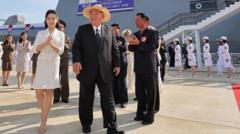The outcome of South Korea's presidential election today will likely shape the nation's path, addressing critical issues that have arisen from the recent political upheaval triggered by former president Yoon Suk Yeol's administration.
South Korea Undergoes Pivotal Presidential Elections Amid Political Turmoil

South Korea Undergoes Pivotal Presidential Elections Amid Political Turmoil
Today marks a significant day in South Korean politics as citizens cast ballots amidst the backdrop of a recent impeachment and societal unrest.
As polls opened at 6 a.m. in South Korea, voters are participating in a critical presidential election that follows political upheaval instigated by the impeachment of conservative president Yoon Suk Yeol. The election centers around the candidacy of Lee Jae-myung, the leader of the Democratic Party and the current favorite, and his challenger, Kim Moon-soo, representing the conservative People Power Party.
This election is widely viewed as a referendum on Yoon's presidency, which ended in controversy after his brief declaration of martial law in December led to significant public discontent. Lee has committed to dismantling the remnants of the Yoon administration, calling for an end to "insurrection" and promising a return to stability. In contrast, Kim Moon-soo, despite being associated with Yoon's party, is attempting to distance himself from the former president's legacy by warning voters against Lee's potential rise to power. He argues that a victory for Lee would threaten South Korea's alliances, particularly with the United States, and move the country closer to China and North Korea.
As Lee faces several criminal trials, the implications of his potential presidency carry weighty considerations for South Korea's governance. Should he win, it will be crucial to observe how the constitutional challenges surrounding his authority are navigated. Observers and political analysts are keenly watching how this election, amidst an array of pressing issues, will not only impact South Korea's leadership but also the nation's future direction on a broader geopolitical scale.





















